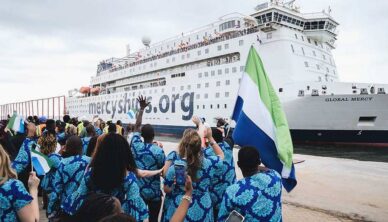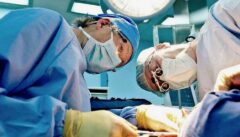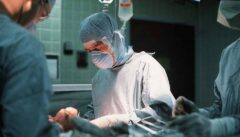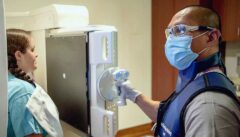Contents
Shared Benefit From Maxillofacial Care

A Lifeline for Sierra Leone
In August 2023, the Global Mercy sailed into Freetown Harbour, where she will remain for 10 months, providing care and hope to thousands.
The UK has around 10,000 anaesthetists serving a population of 67 million. In contrast, Sierra Leone’s public health system has just two anaesthetists for a population of nine million.
Other surgical specialities are similarly underrepresented, leaving the people of Sierra Leone with limited access to general, orthopaedic, paediatric, and other vital forms of surgery.
All these services play a crucial role in rebuilding lives, yet maxillofacial surgery is frequently mentioned by patients and often featured in related literature.
A Dual Nature
Maxillofacial surgery is inherently dual in both profession and purpose. Consultants in this field are qualified as both doctors and dentists, but the second aspect is more nuanced.
Those who perform maxillofacial surgery must consider both function and appearance. The ability to breathe, eat, taste, and swallow are fundamental to life—yet how we look to others can be just as significant.
This is not to diminish the value of a paediatrician correcting bowed legs or an orthopaedic surgeon replacing a damaged shoulder. Rather, it highlights that the effects of maxillofacial care are often immediately visible, and therefore, deeply felt.
Through this discipline, jaws can be rebuilt, large facial tumours removed, cleft lips and palates repaired, and a range of reconstructive procedures performed that change lives at a glance.
Building the Future
Sierra Leone’s healthcare system has made strides in recent years. Primary care is now more accessible, but the need for safe, reliable surgical care remains critical—alongside education to ensure long-term sustainability.
The team aboard the Global Mercy is focused on transferring skills, working hand-in-hand with local healthcare professionals to share knowledge, techniques, and best practices. A collaborative approach aimed at long-term growth.
The specialists onboard hope to carry out 2,000 life-changing surgeries during their stay. However, they recognise that the operations performed by local surgeons in the years to come are even more important.
One patient, who received the first stage of surgery during a visit from the original Mercy Ship, had to wait nine years for the next ship to return and continue treatment. Others have waited just as long for any care at all.
By helping to build a sustainable surgical infrastructure, the visiting team will ultimately support far more patients and plant the seeds of a self-sufficient system that can flourish.
Leading by Example
Dr Sandra Lako, one of the physicians aboard, grew up partly on a Mercy ship and has since dedicated her life to their mission.
Others on board bring personal stories of transformation and are united by a shared commitment to service.
Curing serious conditions is, of course, a major part of their work—but so too is the spirit they carry. A spirit of care, peace, and equality. A willingness to freely share their skills and ensure that everyone, regardless of background, has access to the treatment they need.
For many in Sierra Leone, the only current alternative is to pay for surgery and travel abroad—something few can afford. Most are left to live with their condition and its consequences.
21 September 2023



